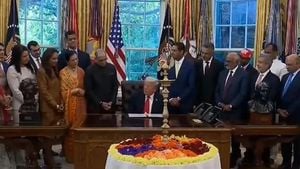Brazil is making strides toward sustainable development, and recent community initiatives have played a key role. The country hosted a vibrant community forum aimed at tackling pressing societal issues such as poverty, inequality, and environmental sustainability. This event emphasized the importance of grassroots engagement, as both government officials and community leaders gathered to share insights and strategies. Instead of approaching these issues from the top down, the Brazilian government is shifting its focus to inclusivity, encouraging active participation from all sectors of society.
During the forum, local residents voiced their priorities, addressing challenges like inequality and the need for improved access to sanitation and digital resources. One community member, Maria Santos, expressed skepticism about the effectiveness of these initiatives, highlighting her concerns over existing infrastructure issues. Despite the optimism surrounding Brazil’s leadership summit, she doubts it will lead to meaningful change for her community.
Alongside the forum, Brazil held a cultural festival celebrating its rich heritage. Local artists took center stage, showcasing their talents and promoting unity through music and art. The festival aimed not just to entertain but also to amplify the voices of marginalized groups, fostering community solidarity as they strive for sustainable progress.
But let’s take it beyond the surface—what are the fundamental questions surrounding community empowerment for sustainable development? A few pivotal ones arise: How can local knowledge be integrated effectively? What role does technology play in bridgin gaps between urban and rural communities? And, perhaps most critically, how can grassroots initiatives be scaled to tackle widespread social and environmental issues?
Facing these questions is not without its challenges. One major issue is the balance of power within communities, especially when it involves decision-making. There’s the risk of some voices being overrepresented, leading to potential conflicts over resource allocation and representation.
On the flip side, empowering local communities can lead to more relevant and adaptable solutions. This process nurtures local capacities and ensures long-term sustainability for development projects. Engaging communities enhances social cohesion, fostering resilience against future challenges.
But it’s not all sunshine and rainbows. Communities often grapple with limited financial resources, which can hinder their ability to implement sustainable practices. Also, the complexity of ensuring accountability and transparency can make the process arduous. Without overcoming these challenges, the noble intention of empowering local communities might stall.
Moving on, another facet of Brazil's sustainable initiative involves exploring alternatives to biofuels. This sector has traditionally relied on sugarcane ethanol, but increasing concerns about sustainability have sparked interest in greener options. Policymakers are now tasked with considering renewable solutions such as solar, wind, and hydroelectric power as more viable paths to energy independence and environmental protection.
A significant advantage of diversifying Brazil's energy mix is enhancing its resilience against global shocks, such as fluctuated oil prices. By investing more heavily in green energy, Brazil could streamline its energy production and cultivate economic stability. For example, geothermal energy remains largely untapped. This renewable source offers consistent power generation, independent of weather changes, breaking away from the constraints faced by solar or wind power.
Of course, embracing geothermal energy presents its own challenges. The initial investment can be steep, and not every region has accessible geothermal resources. But the potential rewards—a cleaner, more reliable energy source—make it worth considering.
Now, let’s pivot to the pressing topic of plant-based proteins. Recently, there’s been a notable uptick in consumer demand for sustainable plant-based alternatives. This trend is reshaping the traditional meat industry, fostering competition and innovation. A standout example is MarketProtein, which has reported impressive growth, largely due to its plant-based protein line. Their net profits soared by 20%, signaling a clear shift toward sustainable options.
Evolving consumer preferences mean traditional meat producers must adapt quickly. They face the dual challenge of meeting rising sustainability standards and battling the growing popularity of plant-based products. It raises key questions: How will these companies reshape their production techniques to align with consumer expectations? How can they sustain global food security amid these shifts?
The advantages of plant-based proteins include their lower environmental impact compared to traditional meat production. They need less land and water to produce, appealing to eco-conscious consumers. Plus, many plant-based options are healthier, typically containing less saturated fat and cholesterol. But the meat industry is not going down without a fight—one of its major hurdles lies in replicability, particularly matching the taste and texture of meat, which remains a top priority for many consumers.
Yet, within these challenges also lie immense opportunities. Traditional meat companies have the chance to blend plant-based alternatives with their offerings, positioning themselves to capture the growing market. By embracing sustainable practices and innovation, they can meet the demands of today’s eco-aware consumers.
Brazil, with its rich resources and vibrant communities, stands at the forefront of this evolution. Initiatives focusing on sustainable development, community empowerment, and alternatives to traditional energy and protein sources are paving the way for a greener future. If these endeavors prove successful, they could not only uplift local communities but also redefine the nation's economic framework, making Brazil a leading example for sustainable practices across the globe.
Given the fast-changing dynamics of globalization and climate change, Brazil's efforts represent more than just local initiatives; they signify the potential for nationwide transformation. By prioritizing sustainability and inclusivity, the country may well lead the charge against pressing global challenges.



